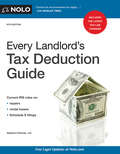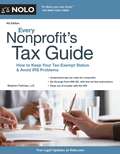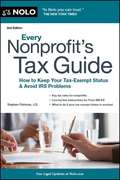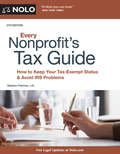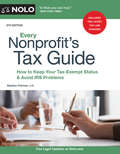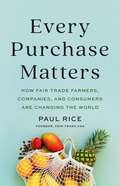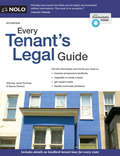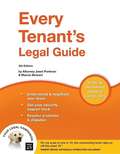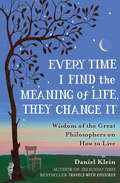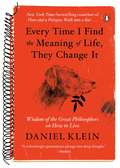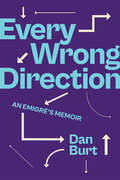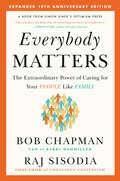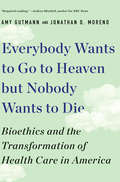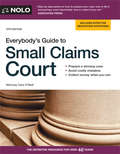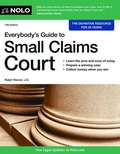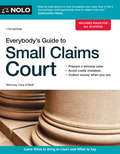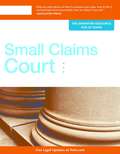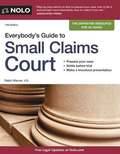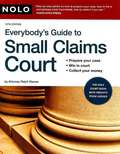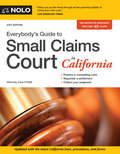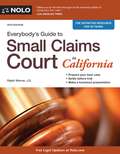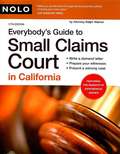- Table View
- List View
Every Landlord's Tax Deduction Guide
by Stephen FishmanMaximize your tax deductions Rental real estate provides more tax benefits than almost any other investment. Every Landlord’s Tax Deduction Guide is the only book that focuses exclusively on IRS rules and deductions for landlords. The book covers the new tax law, including the new 20% pass-through deduction and other deduction and depreciation changes that are particularly beneficial to landlords. Learn about landlord tax classifications, reporting rental income, hiring workers, and depreciation. Find out how to: handle casualty and theft losses distinguish between repairs and improvements deduct home office, car, travel, and meals keep proper tax records—and much more. Filled with practical advice and real-world examples, Every Landlord’s Tax Deduction Guide will save you money by making sure you owe less to the IRS at tax time. This new edition includes comprehensive coverage of the Tax Cuts and Jobs Act and how it affects landlords.
Every Landlord's Tax Deduction Guide
by Stephen Fishman J.D.The only book on tax deductions specifically for residential landlords! Named a "Top 10 Real Estate Book" by Robert Bruss, syndicated real estate columnist If you own rental property, you should be taking advantage of the many tax write-offs available. Every Landlord's Tax Deduction Guide gives residential landlords the plain-English guide they need to save money on taxes -- without the services of a pricey accounting firm. This book explains how to maximize your deductions without drawing the ire of the IRS. Find out how to: fill out IRS Schedule E take real estate tax credits figure out if an expense is a repair (deductible) or an improvement (depreciable) maximize your depreciation deductions deduct losses arising from real estate ownership keep proper tax records deduct home office, travel, and casualty losses Every Landlord's Tax Deduction Guide is comprehensive yet easy to read and provides interesting real-world examples. This edition is completely updated for 2014 returns and reflects the latest tax information and numbers.
Every Nonprofit's Tax Guide
by Stephen FishmanNonprofits enjoy privileges not available to other organizations. But these privileges come at a price: Nonprofits must comply with special IRS rules and regulations. This book covers what your organization must do to maintain its tax-exempt status. Practical, comprehensive, and easy to understand, Every Nonprofitâ TMs Tax Guide explains ongoing and annual IRS compliance requirements for nonprofits, including: a detailed look at Form 990 line-by-line instructions for Form 990-EZ conflicts of interest and compensation rules charitable giving rules unrelated taxable business income rules lobbying and political activity restrictions nonprofit bookkeeping other key tax rules Whether you are just starting your nonprofit or are well established, youâ TMll find all the information you need to avoid the most common issues nonprofits run into with the IRS.
Every Nonprofit's Tax Guide
by Stephen Fishman J.DTax rules for your nonprofit -- stay legal and keep the IRS off your back Your nonprofit enjoys special privileges not available to other organizations -- but they come at a price. Nonprofits must comply with rules and regulations that don't apply to for-profit ventures. Every Nonprofit's Tax Guide explains these rules and what your nonprofit must do to maintain your tax-exempt status and avoid problems with the IRS. This practical, thorough, and easy-to-read book explains both ongoing and annual compliance requirements for nonprofits, including: rules for charitable giving and cash donations Form 990 unrelated taxable business income annual IRS filings and disclosures property donations bookkeeping basics working with independent contractors and volunteers restrictions on lobbying and political activities Plus, the book also includes a chapter on the types of transactions that can get your nonprofit in hot water with the IRS.
Every Nonprofit's Tax Guide: How to Keep Your Tax-Exempt Status & Avoid IRS Problems
by Stephen FishmanThe essential tax reference book for every nonprofit Nonprofits enjoy privileges not available to other organizations. But these privileges come at a price: Nonprofits must comply with special IRS rules and regulations. This book covers what your organization must do to maintain its tax-exempt status. Practical, comprehensive, and easy to understand, Every Nonprofit’s Tax Guide explains ongoing and annual IRS compliance requirements for nonprofits, including: a detailed look at Form 990 line-by-line instructions for Form 990-EZ conflicts of interest and compensation rules charitable giving rules unrelated taxable business income rules lobbying and political activity restrictions nonprofit bookkeeping other key tax rules Whether you are just starting your nonprofit or are well established, you’ll find all the information you need to avoid the most common issues nonprofits run into with the IRS.
Every Nonprofit's Tax Guide: How to Keep Your Tax-Exempt Status & Avoid IRS Problems
by Stephen FishmanThe essential tax reference book for every nonprofit Nonprofits enjoy privileges not available to other organizations. But these privileges come at a price: Nonprofits must comply with special IRS rules and regulations to maintain their tax-exempt status. Practical, comprehensive, and easy to understand, Every Nonprofit’s Tax Guide explains ongoing and annual IRS compliance requirements for nonprofits, including: a detailed look at Form 990 line-by-line instructions for Form 990-EZ conflicts of interest and compensation rules charitable giving rules unrelated taxable business income rules lobbying and political activity restrictions nonprofit bookkeeping, and other key tax rules. Whether you are just starting your nonprofit or are well established, you’ll find all the information you need to avoid the most common issues nonprofits run into with the IRS. Updated to include new rules that affect nonprofits under the Tax Cuts and Jobs Act, effective in 2018.
Every Purchase Matters: How Fair Trade Farmers, Companies, and Consumers Are Changing the World
by Paul RiceNATIONAL BESTSELLER * From the founder and CEO of Fair Trade USA, a critical account of the past, present and future of conscious capitalism—the change it has wrought in the world and the potential it still has to confront our greatest challenges. We all have the power to change the world through the products we buy. This simple premise has driven the growth of the conscious consumer movement for decades. Indeed, what started with a handful of niche sustainability brands has exploded into the mainstream with labels like Organic, Non-GMO, and Fair Trade Certified now adorning products in major retailers across the country. Yet the true promise of ethical sourcing and conscious consumerism has not been fully realized. Paul Rice has dedicated his career to helping consumers and businesses embrace the power they have to protect the environment and improve the lives of farmers and workers on the far side of our global supply chains. In Every Purchase Matters, Rice reveals the untold story of the Fair Trade movement and its significance for us all. Calling on the close relationships he cultivated over the last forty years with the pioneers of ethical sourcing—CEOs, activists, grassroots farmer leaders, and consumer advocates—Rice gives voice to the visionaries and practitioners who are making sustainable business the new normal. These protagonists share successes and failures, lessons learned, and their extraordinary impact in communities around the world. Their stories illuminate how sustainability is good not only for people and planet but also for business. Whether you&’re a consumer, a business leader, or an investor, Every Purchase Matters offers a rich and persuasive case for conscious capitalism—the change it has brought and the potential it still has to create a more just, equitable, and sustainable world.
Every Tenant's Legal Guide
by Janet Portman Marcia StewartWhat every renter needs to know The only book of its kind, Every Tenant's Legal Guide gives you the legal and practical information (plus dozens of sample letters) you need to: find a great home and landlord know your rights when it comes to pets fight improper rent increases and late fees get a landlord to make repairs pronto withhold rent without getting into legal trouble protect your privacy fight illegal discrimination handle roomate problems deal with lead paint, mold, asbestos and bed bugs break a lease with minimum financial liability get your security deposit back The 8th edition of Every Tenant's Legal Guide includes the latest laws of your state--from security deposit rules to termination notice requirements, and a new section on tenant rights to use Airbnb and similar services.
Every Tenant's Legal Guide
by Janet Portman Marcia Stewart<P>The only book of its kind, Every Tenant's Legal Guide gives you the legal and practical information (plus dozens of sample letters) you need to: <P>find a great home and landlord <br>know your rights when it comes to pets <br>fight improper rent increases and late fees <br>get a landlord to make repairs pronto <br>withhold rent without getting into legal trouble <br>protect your privacy <br>fight illegal discrimination <br>handle roommate problems <br>deal with lead paint, mold, asbestos and bed bugs <br>break a lease with minimum financial liability, and <br>get your security deposit back <p>This 9th edition of Every Tenant's Legal Guide includes the latest state rules and procedures on tenant rights, including how to legally break a lease and fight an eviction.
Every Tenant's Legal Guide (5th edition)
by Janet Portman Marcia StewartAttorney Portman and consumer rights specialist Stewart update their guide to dealing with both the ordinary and the exceptional aspects of renting a place to live on the planet where they were born. Among their topics are finding a place, basic rent rules, inspecting the unit and moving in, repairs, improvements, privacy, environmental hazards, crime on the premises, moving out and getting the deposit back, and resolving problems without a lawyer. Tables are appended summarizing relevant laws in the various states. No legal background is required. Annotation ©2007 Book News, Inc., Portland, OR (booknews.com)
Every Tenant’s Legal Guide
by Janet Portman AttorneyRent smart with the definitive all-in-one book for every tenant! Every Tenant's Legal Guide gives you the legal and practical information you need to deal with your landlord and other tenants, and protect your rights when things go wrong. Written in plain English, it shows you how to: inspect a place before you move in negotiate a lease or rental agreement put roommate relationships on a sound legal footing understand key rules on rent increases and rent control get needed repairs and maintenance protect your privacy fight illegal discrimination break a lease with minimum financial liability get your security deposit back understand and prepare for eviction proceedings This edition of Every Tenant's Legal Guide comes complete with forms, as well as charts that help you find and understand the latest laws of your state. Plus, get timely information about bedbugs, what to do if you're caught in foreclosure, and new protections for victims of domestic violence.
Every Time I Find the Meaning of Life, They Change It
by Daniel KleinFifty years ago, Daniel Klein began studying philosophy at Harvard University, hoping to find an answer to that most burning of questions: what is the best way to live my life? He thought the great philosophers would be able to give him some ideas, or at least some clues. But, aside from the occasional hint, all he got were more questions, ones which philosophers thought needed answering first. They included 'what is the meaning of meaning?' and 'how can we know what is true?'Now in his seventies and looking back on his life, Klein brings us a personal commentary on the great philosophical pronouncements he's collected over the years. Told with the same brilliantly dry sense of humor that made Travels with Epicurus so popular, Every Time I Find the Meaning of Life is an eminently readable series of thoughts on wise words.
Every Time I Find the Meaning of Life, They Change It
by Daniel KleinA humorous and philosophical trip through life, from the New York Times-bestselling coauthor of Plato and a Platypus Walk into a Bar . . . Daniel Klein's fans have fallen in love with the warm, humorous, and thoughtful way he shows how philosophy resonates in everyday life. Readers of his popular books Plato and a Platypus Walk into a Bar . . . and Travels with Epicurus come for enlightenment and stay for the entertainment.As a young college student studying philosophy, Klein filled a notebook with short quotes from the world's greatest thinkers, hoping to find some guidance on how to live the best life he could. Now, from the vantage point of his eighth decade, Klein revisits the wisdom he relished in his youth with this collection of philosophical gems, adding new ones that strike a chord with him at the end of his life. From Epicurus to Emerson and Camus to the theologian Reinhold Niebuhr--whose words provided the title of this book--each pithy extract is annotated with Klein's inimitable charm and insights. In these pages, our favorite jokester-philosopher tackles life's biggest questions, leaving us chuckling and enlightened.
Every Wrong Direction: An Emigré’s Memoir
by Dan BurtEvery Wrong Direction recreates and dissects the bitter education of Dan Burt, an American émigré who never found a home in America. It begins in the row homes of Jewish immigrants and working-class Italians on the mean streets of 1950s South Philadelphia. Every Wrong Direction follows the author from the rough, working-class childhood that groomed him to be a butcher or charter boat captain, through America, Britain and Saudi Arabia as student, lawyer, spy, culture warrior, and expatriate, ending with a photo of his college rooms at St John’s College, Cambridge. Between this beginning and end, through a Philadelphia commuter college, to Cambridge, then Yale Law School, across the working to upper classes, three countries, and seven cities over 43 years, it maps his pursuit of, realization, disillusionment with and abandonment of America and the American Dream. Praise for Dan Burt's previous memoir, You Think It Strange: “Burt’s early life was indeed a triumph of wit and will. He managed to escape a world filled with violence and a culture that valued street smarts over book smarts, all the while knowing that just about everyone around him thought little of his prospects. That he made it out at all is extraordinary. That he became a successful lawyer and writer is virtually unimaginable.” —Commonweal “Dan Burt is a fine poet, and this memoir has all the sensitivity and vigilance you might expect from a writer with such a background. But his prose also has a robustness and documentary power that continually startles and engages. As it combines these things, You Think It Strange catches the strangeness of the world and makes it familiar.” —Sir Andrew Motion, Poet Laureate of the United Kingdom, 1999-2009
Everybody Matters: The Extraordinary Power of Caring for Your People Like Family--Expanded 10th Anniversary Edition
by Bob Chapman Raj SisodiaNow revised and expanded with five new chapters for the 10th anniversary of its 2015 publication, the beloved classic on truly human leadership&“Bob Chapman, CEO of the $1.7 billion manufacturing company Barry-Wehmiller, is on a mission to change the way businesses treat their employees.&” – Inc. MagazineStarting in 1997, Bob Chapman and Barry-Wehmiller have pioneered a dramatically different approach to leadership that creates off-the-charts morale, loyalty, creativity, and business performance. The company utterly rejects the idea that employees are simply functions to be moved around, &“managed&” with carrots and sticks, or discarded at will. Instead, Barry-Wehmiller manifests the reality that every single person matters, just like in a family. It&’s not a cliché on a mission statement; it&’s the bedrock of the company&’s success.It&’s natural to be skeptical when you first hear about this approach. Every time Barry-Wehmiller acquires a company whose team members have experienced more traditional management practices, the new team members are skeptical too. But they soon learn what it&’s like to work at an exceptional company where the goal is for everyone to feel trusted and cared for—and where it&’s expected that they will justify that trust by caring for one another and putting the common good first. Chapman and coauthor Raj Sisodia show how any organization can reject the traumatic consequences of rolling layoffs, dehumanizing rules, and hypercompetitive cultures. In this tenth anniversary update to Everybody Matters, Chapman and Sisodia share new statistics and analysis on the leadership crisis that continues to plague modern businesses and that only Truly Human Leadership—pioneered at Barry-Wehmiller—can fix. Packed with additional insights gained over a decade as the company has evolved, weathered a pandemic, and grown from $1.7 billion in annual revenue with 100 acquisitions to $3.6 billion with more than 140 acquisitions, this updated classic is needed now more than ever.As Chapman says, &“The way we lead impacts the way people live.&” Once you stop treating people like functions or costs, disengaged workers begin to share their gifts and talents in service of a shared future. Uninspired workers stop feeling that their jobs have no meaning. Frustrated workers stop taking their bad days out on their spouses and kids. And everyone stops counting the minutes until it&’s time to go home. This is the journey documented in Everybody Matters; now it&’s time to transform your own workplace.
Everybody Wants to Go to Heaven but Nobody Wants to Die: Bioethics And The Transformation Of Health Care In America
by Amy Gutmann Jonathan D. MorenoAn incisive examination of bioethics and American healthcare, and their profound affects on American culture over the last sixty years, from two eminent scholars. An eye-opening look at the inevitable moral choices that come along with tremendous medical progress, Everybody Wants to Go to Heaven but Nobody Wants to Die is a primer for all Americans to talk more honestly about health care. Beginning in the 1950s when doctors still paid house calls but regularly withheld the truth from their patients, Amy Gutmann and Jonathan D. Moreno explore an unprecedented revolution in health care and explain the problem with America’s wanting everything that medical science has to offer without debating its merits and its limits. The result: Americans today pay far more for health care while having among the lowest life expectancies and highest infant mortality of any affluent nation. Gutmann and Moreno—“incisive, influential, and pragmatic thinkers” (Arthur Caplan)—demonstrate that the stakes have never been higher for prolonging and improving life. From health care reform and death-with-dignity to child vaccinations and gene editing, they explain how bioethics came to dominate the national spotlight, leading and responding to a revolution in doctor-patient relations, a burgeoning world of organ transplants, and new reproductive technologies that benefit millions but create a host of legal and ethical challenges. With striking examples, the authors show how breakthroughs in cancer research, infectious disease, and drug development provide Americans with exciting new alternatives, yet often painful choices. They address head-on the most fundamental challenges in American health care: Why do we pay so much for health care while still lacking universal coverage? How can medical studies adequately protect individuals who volunteer for them? What’s fair when it comes to allocating organs for transplants in truly life-and-death situations? A lucid and provocative blend of history and public policy, this urgent work exposes the American paradox of wanting to have it all without paying the price.
Everybody's Guide to Small Claims Court
by Cara O'NeillWin your small claims case! You don't need a lawyer to win in small claims court if you know how to prepare and present your own case. Everybody's Guide to Small Claims Court provides the information, tips, and strategies you need to sue someone successfully or to put up a winning defense in any state. Find out how to: file and serve papers mediate an out-of-court settlement prepare evidence to support your case decide how much to sue for line up persuasive witnesses present a winning case, and collect money when you win. The updated 18th edition includes the latest procedures for small claims courts in every state, sample letters, legal forms, and more.
Everybody's Guide to Small Claims Court
by Ralph Warner Editors Of NoloSuccessfully present and win your small claims court case. Thorough preparation for your day in small claims court can make the difference between writing a check and receiving one, so get the only guide to small claims court that provides tips by former judges. Everybody's Guide to Small Claims Court helps you bring or defend your small claims suit without a lawyer. It shows you how to build your case, present evidence, and covers in detail what to expect when you have personal injury, auto damage, dry cleaning damage, or landlord/tenant issues. Find out how to: write a demand letter file and serve papers prepare a winning presentation prepare and present evidence in court line up persuasive witnesses figure out your how much compensation you deserve mediate a settlement collect money when you win This edition is completely updated with a current appendix of small claims rules, including increases in the amounts for which people can sue. Are you a California resident? Check out Everybody's Guide to Small Claims Court in California.
Everybody's Guide to Small Claims Court
by Ralph Warner Editors of NoloWin your small claims case! You don't need a lawyer to win in small claims court. You need to know how to prepare and present your own case. Smart preparation for your day in court can make the difference between receiving a check and writing one. Everybody's Guide to Small Claims Court provides the information, tips, and strategies you need to sue someone successfully or put up a winning defense in any state. Find out how to: file and serve papers mediate an out-of-court settlement prepare evidence to support your case decide how much to sue for line up persuasive witnesses present a winning case, and collect money when you win. This edition is completely updated to include the latest procedures and information for small claims courts in every state. Plus, this book includes useful, practical tips by small claims court judges and commissioners who've seen it all. If you are a California resident, check out Everybody's Guide to Small Claims Court in California.
Everybody's Guide to Small Claims Court
by Ralph Warner J. D.You don't need a lawyer to win in small claims court--you need to know how to prepare and present your own case. Smart preparation for your day in court can make the difference between receiving a check and writing one. Everybody's Guide to Small Claims Court provides the information, tips, and strategies you need to sue someone successfully or put up a winning defense. Find out how to: file and serve papers mediate an out-of-court settlement prepare evidence to support your case decide how much to sue for line up persuasive witnesses present a winning case collect money when you win This edition is completely updated to include the latest procedures and information for small claims courts in every state. Plus, this book includes useful, practical tips by small claims court judges and commissioners who've seen it all. If you are a California resident? Check out Everybody's Guide to Small Claims Court in California
Everybody's Guide to Small Claims Court
by Ralph Warner AttorneyThe only guide to Small Claims Court that provides tips by former judges, Everybody's Guide to Small Claims Court helps you bring or defend your small claims suit without a lawyer. This legal primer shows you how to build your case, present evidence, and covers in detail what to expect when you have personal injury, auto damage, dry cleaning damage, or landlord/tenant issues. Find out how to: write a demand letter file and serve papers prepare a winning presentation prepare and present evidence line up persuasive witnesses figure out your damages mediate a settlement collect money when you win This edition is completely updated with a current appendix of small claims rules and limits, an expanded discussion of mediation, and more advice from real judges and commissioners.
Everybody's Guide to Small Claims Court (12th edition)
by Ralph Warner Emily DoskowProper presentation of a small claims court case can make the difference between receiving a check and writing one. This bestselling guide shows readers how to: decide the legitimacy of a case; determine how much to sue for; find out whether it's possible to collect; settle a case before it goes to court; file and serve papers; and more. The book covers small claims court procedures in Canada as well as the U.S.
Everybody's Guide to Small Claims Court in California
by Cara O'NeillEverything you need to win your small claims case in California Smart preparation for your day in small claims court can make the difference between receiving a check for thousands of dollars and writing one. If you’re getting ready to appear before a judge, turn to Everybody’s Guide to Small Claims Court in California. It’s packed with everything you need to know to bring your case—or defend yourself if you’re sued—and win! Find out how to: write a demand letter determine your losses (damages) mediate a settlement file and serve papers gather evidence write your demand letter line up convincing witnesses present your case in court collect money when you win, and understand the appeal process. This edition is updated with the latest California laws and court procedures—features the insights of former judges who presided in small claims cases and advice on completing more than a dozen different court forms.
Everybody's Guide to Small Claims Court in California
by Ralph WarnerEvaluate your claim, figure out your best course of action and represent yourself in small claims court with this definitive guide Everybody's Guide to Small Claims Court in California gives you step-by-step instructions to bring or defend your case. From preparing evidence and lining up persuasive witnesses, to making a presentation in court and collecting the money you're awarded, this plain English book leads you through the entire process of going to court without a lawyer. Plus, it's the only book around that helps you factor in out-of-court issues, such as personal relationships, to help you determine whether going to court is worth the potential for recovery. Everybody's Guide to Small Claims Court in California shows you how to: evaluate whether you have a winning case mediate a settlement determine how much to sue for write your demand letter file and serve papers prepare evidence and witnesses for court plan a winning courtroom strategy convince the judge that you are right collect your money when you win This edition is updated with the latest rules and statutes for California's small claims courts, including instructions for accessing local courts and finding out their procedures.
Everybody's Guide to Small Claims Court in California (17th edition)
by Ralph Warner Emily DoskowThe definitive guide for more than 20 years, this book explains how to present a winning case from start to finish. It illustrates how to: decide the legitimacy of a case; write a demand letter; file and serve papers; prepare evidence and witnesses for court; argue before a judge; defend a Small Claims case; and collect money after winning. Includes down-to-earth examples of the most common Small Claims Court cases.
